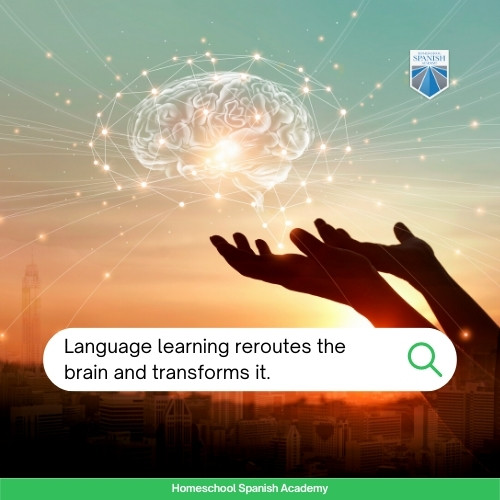
10 Ways To Learn a Language if You Have a Poor Memory
There are many creative ways to learn a language and become fluent. Even when your memory seems to fail you, you’ll be surprised how tricking your brain into learning Spanish is possible.
Speaking Spanish fluently requires you to learn loads of vocabulary. The real challenge is retaining it and putting it to use while combining grammar, pronunciation, and more.
Although our brain and memory have key roles when it comes to learning a new language, ultimately, it’s practice that makes perfect. Immersion and using non-traditional methods with language learning techniques brings you closer to your Spanish goals.
Stay motivated with this list of 10 ways to learn a language if you have a poor memory.
Is It Possible To Learn Spanish With a Bad Memory?
The short answer is yes, it’s perfectly possible.
Consider that when you learn something new you exercise your brain. You work on your concentration and dedicate time to enhancing your poor memory.
However, this new knowledge needs diverse reinforcement. Using different methods and ways to learn a language keeps you engaged.
There’s no need to focus all your efforts only on memorizing content, words, and grammar rules. Often, this daunting memorizing process is what makes a student lose motivation.
There’s other more practical aspects of Spanish that can keep you focused.
As you advance and put to practice what you learn, it comes easier and your brain is able to recall it faster.

Language Learning and the Brain
Young students don’t struggle like adults do when it comes to ways to learn a language. Kids are fast learners who even have the capacity of developing an accent at a young age.
The truth is that adults often take longer than kids to learn, but scientifically, adult brains are designed to a new language without complications.
Learning Spanish is possible during most stages of life, read more in Spanish for Seniors: 13 Extraordinary Benefits of Learning Language After Age 60.
How Does the Brain Learn a Language?
Language learning reroutes the brain and transforms it. There are a few areas of the brain that are specifically associated with language learning.
The brain’s temporal left lobe is home to Broca’s area, the part responsible for speech articulation and production. This lobe of the brain is also home to Wernike’s area, associated with language development and comprehension.
However, the way our brains learn a new language requires them to exchange information between both the left and right areas.
According to a study at the Memorial Sloan Kettering Cancer Center in New York, children that learn a new language at an early age store it in their brains with their native language. While adults, store it in a different area.

Benefits of Learning a New Language for Your Brain
Regardless of the different ways our brain has to store new languages, the neurological benefits are considerable—even during adulthood.
The constant exchange between our brain’s left and right increases white and gray matter. This boost is ideal for elevating your concentration, decision making, problem-solving, it develops multitasking, and improves your memory.
Taking on different ways to learn a language brings you closer to a healthier brain, that can even slow down the appearance of degenerative diseases.
Discover 8 Brain Benefits to Learning a Second Language and spark more motivation.
10 Ways To Learn a Language If You Struggle With Memory
Immersion is key when it comes to learning a language and it can be achieved in many ways.
You don’t necessarily have to relocate to a Spanish-speaking country—although it helps—there are other tricks and alternatives you can follow to get the Spanish immersion you need faster, and on your own.
Here are the most effective and fun ways to learn a language when you have a terrifically bad memory.
1. Listen to Music in Spanish
Start curating a Spanish only playlist of your go to soothing musical genres.
Learning Spanish vocabulary requires you to concentrate, so you should choose music that calms you, which ultimately relaxes the brain.
Your brain responds to sounds that help it hold attention. Rhythm also enhances the memory and makes it easier to memorize through rhymes and verses.
You’ll discover entirely new vocabulary and will improve your Spanish listening and pronunciation. Having the lyrics handy when enjoying Spanish music time also supports spelling and reading.
Read more about How Can Physical Activity Support Language Learning.
3. Learn Spanish in Your Sleep
This is one of those ways to learn a language you wouldn’t believe actually works!
However, learning Spanish in your sleep is possible by making the most of this down time.
According to Cerebral Cortex, listening to Spanish vocabulary and audio in your sleep supports your capacity of retaining it.
As it absorbs information, your brain compartmentalizes it and decides which is important to remember.
When you reinforce recently learned vocabulary in your sleep, you’re reminding your brain that it’s valuable information.
You can use YouTube videos or Audiobooks to start, along with other fun ways of tricking your brain into Learning Spanish in Your Sleep.
4. Try a Spaced Repetition Schedule
Using the spaced repetition method is highly effective for those with a bad memory.
Spaced repetition is one of those ways to learn a language that brings fast proficiency.
The technique consists of learning a specific subject and allowing longer and longer periods of time pass between one training session and the next.
The method doesn’t make you memorize large chunks of information, but smaller, manageable quantities that allow your brain to consolidate it and retain it.
Spaced repetition requires you to plan and distribute your time for worthy results. Tackle this method and get to Learning Spanish with a Spaced Repetition Schedule.
5. Set Up Anki Flashcards
Spanish flashcards come in all shapes. You can use them illustrated, digital, or handmade. You can decide to focus them on words, phrases, and add your personal style to them.
When combined with spaced repetition, flashcards are highly effective for learning a language.
Using an app like Anki that facilitates this combination is proven to bring effective results to language learners.
As you use Anki flashcards, your brain starts to create a relationship to the vocabulary and does it consistently through spaced repetition.
This improves your concentration because you’re focused on your learning, but also on creating your own decks of flashcards and following your learning plan on an app.
Support your memory retention and give digital flashcards a try with this practical Guide to Use Anki.
6. Enjoy Spanish Podcasts
Look for current news and topics of your interest on Spanish podcasts.
Find those that have eloquent and slow-speaking hosts. You’ll be amazed to discover there’s even podcasts only focused on Spanish learners.
Listening to interesting discussions and narratives in Spanish will attract your attention and keep your brain focused.
If you discover a podcast that keeps you interested and is memorable, the content will stick with you..
Start with these 5 Spanish Podcasts for Beginners.
7. Employ the Feynman Technique
The acclaimed Feynman technique is a simple strategy for learning information in concise and simple language.
The four stepped technique for learning Spanish requires you to identify the topic, break the information down to the understanding of a 6 year old, close gaps, and simplify.
The Feynman technique is a favorite among the different ways to learn a language. It pushes you to expand vocabulary as you follow the steps.
You get to concentrate on deeper learning and understanding, while improving retention.
Give it a try and put The Feynman Technique to Learn a Language to practice on your own.
8. Regularly Read Spanish Books
Reading is a highly enjoyable activity for Spanish learners.
Are you captivated by romance novels, science fiction, thrillers, or poetry?
The narratives and richness of Spanish books makes them an intense and expressive language that keeps readers engaged.
Reading is one of the best ways to learn Spanish, it’s highly diverse and with a wide selection for you to choose from.
When you read in Spanish, you discover how to contextualize, new vocabulary, idiomatic expressions, and improve comprehension. It keeps you motivated and pushes your brain to concentrate and interpret in another language.
Combine your Spanish reading with 10 Learning Habits of Highly Effective Spanish Learners.
9. Choose to Use Spanish Actively
Even if you’re struggling with remembering the content from today’s Spanish class, whatever you’re able to remember needs to be used.
You need to use Spanish actively throughout your class and day. Pushing yourself to practice with your peers, family, and applying language to your general activities helps you learn it and memorize it.
Speaking Spanish consistently is a fantastic way for developing fluency. Start a conversation with this guide on How to Make Small Talk in Spanish [Easy Conversation]
10. Keep Your Eye on the Prize
Keep your spirits up and focus on your Spanish learning goals no matter what!
It’s no secret that some Spanish learning journeys have discouraging moments, but the long-term results and benefits are worth it.
Alternating between learning methods keeps you actively learning and feeling productive. Your language learning becomes attractive to you and keeps you interested.
You achieve this motivation by diversifying your ways to learn a language and Spanish immersion. This needs to be done in a balanced and organized manner and the possibilities are endless.
Choose other interesting ways to learn a language from 8 Scientifically Proven Ways to Improve Your Memory for New Vocabulary.
HSA Offers the Most Effective Way To Learn a Language
Your memory won’t be an obstacle when you sign up to one of our Spanish programs. Our team has the best tricks for learning Spanish.
Sign up for a free trial class with our experienced teachers from Guatemala.
Once you discover our efficient language learning techniques, you’ll open up a world of professional opportunities and personal development.
Learning Spanish improves your cognitive skills and decision-making abilities. Don’t pass up the opportunity to elevate your capacities and start learning Spanish today.

Join one of the 40,000 classes that we teach each month and you can experience results like these

“It’s great being able to interact with native speaking people and having a conversation with them not just doing all the work on paper. It’s also an amazing opportunity to speak with native Spanish-speaking people without having to travel to a native Spanish-speaking country.”
– Melanie

“It’s a great way to learn Spanish, from native Spanish speakers in a 1-on-1 environment. It’s been fairly easy to schedule classes around my daughter’s other classes. The best value for us has been ordering multiple classes at a time. All the instructors have been great!”
– Cindy D, Parent of 3

“My Son, Heath, is taking the classes. He’s been with Luisa the entire time and we absolutely love her. She is always patient and is a great teacher. Heath’s dad speaks Spanish so they get to have little conversations.”
– William R, Parent of 3
Want more free Spanish lessons, fun content, and easy learning strategies? Check these out!
- How to Finally Roll Your R’s – And Why It’s Not a Big Deal If You Can’t
- The 25 Most Useful Spanish Phrases You Need to Lear Today
- From ‘Hola’ to Holding Conversations: Your 30-Day Beginner Spanish Challenge
- How to Learn Spanish as an Adult (Even If You Think It’s Too Late)
- Spanish Fluency for Beginners: Why 1-on-1 Lessons Work Best for Elementary Kids
- 5 Proven Ways to Boost Spanish Proficiency in Elementary Beginners — Even If You Don’t Speak Spanish
- 5 Mistakes That Prevent Kids from Improving Spanish — and How Parents Can Help Fix Them
- How to Help Your Child Speak Spanish with Confidence (Without Feeling Embarrassed!)
- Doing Chores at Home (Free Spanish Lessons for Kids) - February 5, 2025
- 12 Contemporary Spanish Female Artists Who Will Empower You - January 16, 2025
- 29 Cool and Catchy Spanish Phrases To Use With Friends [+Audio] - January 8, 2023





